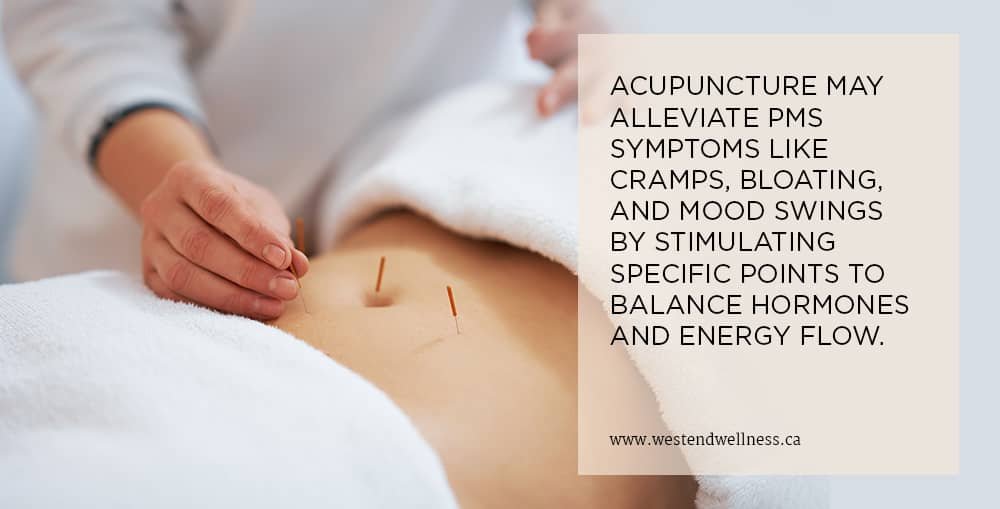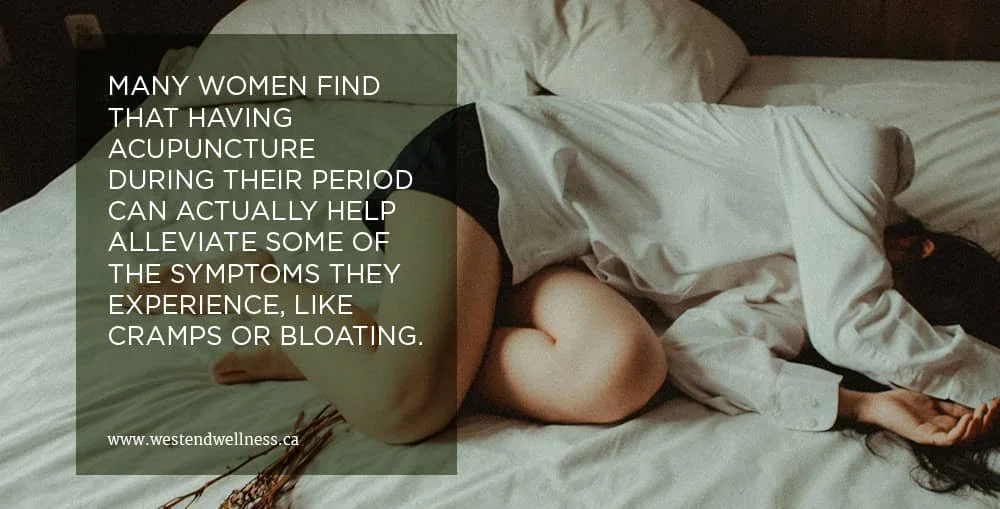Women's Health: How Acupuncture Can Help Relieve Period Pain
Table of Contents Show
As an acupuncturist with years of experience in women's health, I've seen firsthand the transformative power of Acupuncture in managing period pain. It's not just about the needles; it's about understanding your body and finding balance.
Let's explore how this ancient practice can bring relief and comfort during your menstrual cycle.
Can Acupuncture Help with Period Pain?
Understanding How Acupuncture Targets Period Pain
Imagine your body as a landscape, with energy flowing like rivers. Sometimes, this flow gets blocked, especially during your period, leading to pain and discomfort.
Acupuncture gently nudges these blockages, restoring balance and easing pain. It's like a natural reset button, helping your body heal itself. When those thin needles touch specific points, they're not just treating the symptoms; they're addressing the root cause of your menstrual cramps.
Scientific Evidence Supporting Acupuncture for Period Pain
While the scientific community continues to explore the efficacy of Acupuncture for period pain, some studies have shown promising results.
In a comprehensive review by Cochrane, which assessed 42 trials involving 4640 women, certain instances indicated Acupuncture's potential benefits over NSAIDs in pain reduction.
Although the overall findings were mixed and not entirely conclusive, these instances highlight the possibility of Acupuncture as a beneficial alternative for managing menstrual pain.
It's important to note that while the evidence quality was variable, the positive outcomes observed in some studies offer hope and encourage further research in this field. To delve deeper into this review, you can visit Acupuncture for period pain.
Patient Experiences: Relief from Period Pain Through Acupuncture
Every woman's experience with period pain is unique, and so is their response to Acupuncture. I've had patients who've tried everything for their menstrual cramps, only to find real relief with Acupuncture.
Their stories aren't just about less pain; they often talk about feeling more in tune with their bodies and experiencing a sense of overall well-being. It's these personal journeys that truly showcase the holistic benefits of Acupuncture.
Positive interactions and open communication elevate morale and team collaboration.
Acupuncture's Effect on the Menstrual Cycle
As an acupuncturist, I often tell my patients that treating period pain is not just about managing pain; it's about understanding and nurturing the menstrual cycle as a whole.
Regulating the Menstrual Cycle with Acupuncture
In my practice, I've seen how Acupuncture can bring a sense of regularity and balance to the menstrual cycle. It's not uncommon for women to experience irregular or painful cycles due to stress, lifestyle, or underlying health issues.
Acupuncture works by encouraging the body's natural healing processes, which can help in regulating the menstrual cycle. It's like helping your body find its rhythm again, making your periods less of a worry and more of a regular, natural occurrence.
Acupuncture's Role in Hormonal Balance
Hormonal imbalances can be the root cause of menstrual discomfort. Acupuncture, in its essence, is about restoring balance, and this includes hormonal health.
By targeting specific acupuncture points, it's possible to influence the endocrine system, which governs hormone release.
This can lead to a more balanced hormonal state, alleviating symptoms like mood swings, bloating, and cramps. It's about creating harmony within your body so that your menstrual cycle doesn't feel like an uphill battle.
Long-Term Benefits of Acupuncture on Menstrual Health
The beauty of Acupuncture is in its cumulative effect. While immediate relief is often experienced, the long-term benefits for menstrual health are truly remarkable. Regular sessions can lead to a more consistent cycle, less pain, and an overall improvement in reproductive health.
It's an investment in your well-being, one that pays off by contributing to a healthier, more comfortable menstrual experience in the long run.
Can Acupuncture Help with PMS?
Addressing PMS Symptoms with Acupuncture
Many of my patients come with questions about PMS. They often ask, 'Can acupuncture help with my PMS symptoms?' The answer isn't straightforward because everyone's experience is unique. For some, Acupuncture has been a key part of managing symptoms like mood swings and bloating.
It's about finding balance, and Acupuncture might help in that process. But it's also about understanding that it might not be a complete solution for everyone.
Comparing Acupuncture with Traditional PMS Treatments
In comparing Acupuncture with traditional treatments, I like to emphasize choice and personal suitability. Acupuncture offers a non-drug approach, which can be appealing if you're looking for more natural methods. But it's not about replacing what works for you.
Sometimes, it's about complementing existing treatments or trying something new when other methods haven't been as effective.
Lifestyle & Dietary Tips Alongside Acupuncture for PMS
When we talk about managing PMS, I always remind my patients that it's not just about one approach. A holistic plan is key. This means considering lifestyle and dietary changes alongside Acupuncture.
Simple things like staying active, eating balanced meals, and managing stress can really enhance whatever benefits acupuncture might offer. It's all about working together to find the best approach for you.
Is it OK to get Acupuncture while menstruating?
Here at West End Wellness, a common concern is whether it's safe to have Acupuncture during menstruation. Absolutely, it is generally safe.
Many women find that having Acupuncture during their period can actually help alleviate some of the symptoms they experience, like cramps or bloating.
However, every individual is different. For some, treatments during menstruation can be more sensitive or uncomfortable, so it is always wise to listen to your body. We can always discuss the best timing for your sessions if you're unsure.
Remember, Acupuncture during menstruation isn't just about managing pain; it's also about maintaining overall menstrual health. It's about finding what feels right for you and working with that.
Lastly, 6 Ways to Reduce Period Pain
As an acupuncturist, I often share holistic approaches to managing period pain with my patients. Here are six effective strategies:
Supplement Yourself: Consider supplements like magnesium or omega-3 fatty acids. They can help reduce cramping and inflammation.
Try a Tea: Herbal teas, particularly those with anti-inflammatory properties like ginger or chamomile, can be soothing during your period.
Eat More Greens: A diet rich in vegetables, especially leafy greens, can help alleviate period pain due to their high nutrient content.
Cut Down on Coffee: Reducing caffeine intake can help minimize bloating and improve sleep, both of which can be problematic during menstruation.
Use a Heating Pad: Applying heat to the lower abdomen can provide immediate relief from cramps.
Try Acupuncture: As we've discussed, Acupuncture may help in managing period pain by restoring bodily balance and reducing inflammation.
Incorporating these strategies into your routine can make a significant difference in managing menstrual discomfort. It's all about finding the right combination that works for you and your body.
If you have any further doubts or questions regarding this subject or another treatment, contact one of our experienced Acupuncturists or Registered Massage Therapists here at West End Wellness Clinic. You can either give us a call or make an appointment.
Disclaimer: Please remember this article is for informational purposes only and should not replace professional medical advice. Please consult a healthcare provider or someone with the correct qualifications before starting any new exercise or treatment program.




